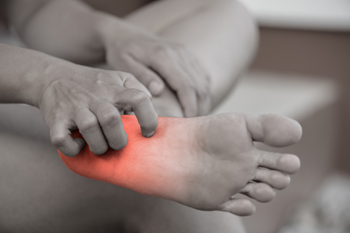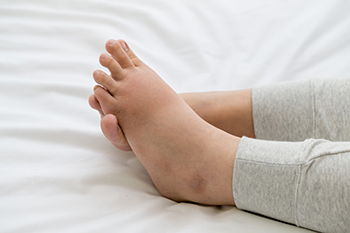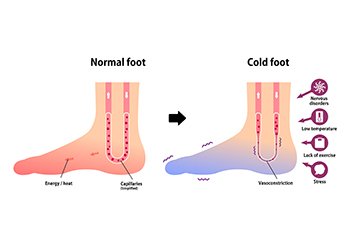Connect With Us
Blog
Items filtered by date: December 2022
Three Groups of Nerves

Damaged nerves in the feet may cause a condition that is called neuropathy. The network of nerves that are found outside the central nervous system are referred to as the peripheral nervous system, and are separated into three categories. Pain and touch are controlled by the sensory nerves, and natural functions consisting of blood pressure and bladder control are grouped into the autonomic nerves. The motor nerves are responsible for controlling muscle movement, and approximately 10 percent of the population in the United Kingdom is affected by neuropathy. Common symptoms that people can experience include a loss of balance, weakened feet, and there may be a numbing, or burning sensation in the hands and feet. People who are diabetic may be susceptible to developing neuropathy, as a result of elevated blood sugar levels. Additionally, a nerve injury may cause this condition, or it may occur from taking specific medications. If you have any of the above symptoms, it is suggested that you seek the counsel of a podiatrist who can guide you toward the right treatment solutions.
Neuropathy
Neuropathy can be a potentially serious condition, especially if it is left undiagnosed. If you have any concerns that you may be experiencing nerve loss in your feet, consult with Jeffrey L. Bober, DPM from Maryland. Our doctor will assess your condition and provide you with quality foot and ankle treatment for neuropathy.
What Is Neuropathy?
Neuropathy is a condition that leads to damage to the nerves in the body. Peripheral neuropathy, or neuropathy that affects your peripheral nervous system, usually occurs in the feet. Neuropathy can be triggered by a number of different causes. Such causes include diabetes, infections, cancers, disorders, and toxic substances.
Symptoms of Neuropathy Include:
- Numbness
- Sensation loss
- Prickling and tingling sensations
- Throbbing, freezing, burning pains
- Muscle weakness
Those with diabetes are at serious risk due to being unable to feel an ulcer on their feet. Diabetics usually also suffer from poor blood circulation. This can lead to the wound not healing, infections occurring, and the limb may have to be amputated.
Treatment
To treat neuropathy in the foot, podiatrists will first diagnose the cause of the neuropathy. Figuring out the underlying cause of the neuropathy will allow the podiatrist to prescribe the best treatment, whether it be caused by diabetes, toxic substance exposure, infection, etc. If the nerve has not died, then it’s possible that sensation may be able to return to the foot.
Pain medication may be issued for pain. Electrical nerve stimulation can be used to stimulate nerves. If the neuropathy is caused from pressure on the nerves, then surgery may be necessary.
If you have any questions, please feel free to contact our office located in Glen Burnie, MD . We offer the newest diagnostic and treatment technologies for all your foot care needs.
Swollen Feet and Foods to Eat

Swollen ankles are often caused by excess fluid. The medical term for swollen ankles is called edema, and it represents fluid that is trapped in the feet and ankles. There are methods that can be implemented, which may help to eliminate edema. Reducing sodium intake, in addition to eating grapes, beets, pineapples, and green leafy vegetables are good sources of vitamin B, and are recommended for this purpose. Additionally, research has shown the importance of incorporating herbs in your dietary habits, such as bilberry and dandelion, that may help to reduce swollen feet and ankles. Many people enjoy getting massages that can release excess bodily fluid, and diuretics may be prescribed that can temporarily relieve swollen feet. If you have this condition, it is suggested that you consult with a podiatrist who can determine the reason why you have swollen feet, and offer correct treatment options.
Swollen feet can be a sign of an underlying condition. If you have any concerns, contact Jeffrey L. Bober, DPM of Maryland. Our doctor can provide the care you need to keep you pain-free and on your feet.
Swollen feet are a common ailment among pregnant women and people who stand or sit for extended periods. Aging may increase the possibility of swollen feet and patients who are obese often notice when their feet are swelling too. There may be medical reasons why swollen feet occur:
- Phlebitis - A condition that causes the veins to become inflamed and can also cause leg pain.
- Liver disease - This may lead to low blood levels of albumin which is a protein. This can cause fluid in the blood to pass into the tissues and several areas of the body can become swollen.
- Heart failure - When the heart doesn’t pump properly the blood that is normally pumped back to the heart can pool in the veins of the legs causing swollen feet.
- Kidney disease - One of the main functions of the kidneys is releasing excess fluid in the body. This type of condition can make it difficult for the kidneys to function properly, and as a result the feet may become swollen.
- Deep-vein thrombosis (DVT)- This is a serious condition where blood clots form in the veins of the legs. They can block the return of blood from the legs to the heart which may cause the feet to swell. It is important to be treated by a podiatrist if this condition is present.
Swollen feet can also be caused by bone and tendon conditions, including fractures, arthritis, and tendinitis. Additionally, there may be skin and toenail conditions and an infection may cause the feet to swell. Patients who take medicine to treat high blood pressure may be prone to getting swollen feet.
Many patients elevate their feet to help relieve the swelling and this is generally a temporary remedy. When a podiatrist is consulted the reason behind the swelling can be uncovered and subsequently treated.
If you have any questions please feel free to contact our office located in Glen Burnie, MD . We offer the newest diagnostic tools and technology to treat your foot and ankle needs.
Cold Feet After Exercising

If your feet feel cold during or right after exercising, when the rest of your body feels warm, it may be a sign that something is wrong. It can be as simple as wearing shoes or socks that are too tight and restrict proper blood flow to the feet. Cold feet after exercising may also be caused by more serious underlying conditions, such as diabetes or peripheral artery disease. Falling or bumping into something during exercise also may cause the feet to become cold. In addition, fractures, bone spurs, or cysts may cause numbness and cold feet. Whatever the cause, having cold feet after exercise is not something to ignore. First, check your footwear to make sure it fits properly and is not laced too tightly. Next, check your feet for any sores or cuts that may have formed. If ignored, these can turn into ulcers. Foot cramps at night or pain that gets worse if your feet are elevated can also be warning signs. If getting cold feet after exercising becomes a common occurrence, it may be wise to visit a podiatrist for an exam, a diagnosis, and a treatment plan.
Foot Pain
Foot pain can be extremely painful and debilitating. If you have a foot pain, consult with Jeffrey L. Bober, DPM from Maryland. Our doctor will assess your condition and provide you with quality foot and ankle treatment.
Causes
Foot pain is a very broad condition that could be caused by one or more ailments. The most common include:
- Bunions
- Hammertoes
- Plantar Fasciitis
- Bone Spurs
- Corns
- Tarsal Tunnel Syndrome
- Ingrown Toenails
- Arthritis (such as Gout, Rheumatoid, and Osteoarthritis)
- Flat Feet
- Injury (from stress fractures, broken toe, foot, ankle, Achilles tendon ruptures, and sprains)
- And more
Diagnosis
To figure out the cause of foot pain, podiatrists utilize several different methods. This can range from simple visual inspections and sensation tests to X-rays and MRI scans. Prior medical history, family medical history, and any recent physical traumatic events will all be taken into consideration for a proper diagnosis.
Treatment
Treatment depends upon the cause of the foot pain. Whether it is resting, staying off the foot, or having surgery; podiatrists have a number of treatment options available for foot pain.
If you have any questions, please feel free to contact our office located in Glen Burnie, MD . We offer the newest diagnostic and treatment technologies for all your foot care needs.
Avoiding Injuries During Sports

Playing sports can be fun and help to keep your body fit, but these activities also may put you at risk of certain injuries. Many injuries incurred while playing a sport are unavoidable, but there are some things you can do to lower the chances of them happening. Stretching and warming up, for instance, is highly recommended before embarking on any strenuous exercise. It is also recommended by experts to listen to your body when it says it needs to rest, rather than pushing on through the pain or fatigue. This can help to avoid strains, sprains, stress fractures, or overuse injuries. Further, to help keep injuries at bay it is suggested to wear any necessary protective gear and footwear specifically designed for that sport. Keeping hydrated before, during, and after sports activity is also desirable. Finally, if you get hurt while playing a sport, stop the activity immediately and rest. Injuries to the Achilles tendon, ankle joint, feet, and muscles will only become worse, and possibly chronic if ignored. It is wise to see a podiatrist if such an injury occurs for a proper diagnosis and treatment plan.
Ankle and foot injuries are common among athletes and in many sports. They can be caused by several problems and may be potentially serious. If you are feeling pain or think you were injured in a sporting event or when exercising, consult with Jeffrey L. Bober, DPM from Maryland. Our doctor will assess your condition and provide you with quality foot and ankle treatment.
Common Injuries
The most common injuries that occur in sporting activities include:
- Achilles Tendonitis
- Achilles Tendon Rupture
- Ankle Sprains
- Broken Foot
- Plantar Fasciitis
- Stress Fractures
- Turf Toe
Symptoms
Symptoms vary depending upon the injury and in some cases, there may be no symptoms at all. However, in most cases, some form of symptom is experienced. Pain, aching, burning, bruising, tenderness, tightness or stiffness, sensation loss, difficulty moving, and swelling are the most common symptoms.
Treatment
Just as symptoms vary depending upon the injury, so do treatment options. A common treatment method is known as the RICE method. This method involves rest, applying ice, compression and elevating the afflicted foot or ankle. If the injury appears to be more serious, surgery might be required, such as arthroscopic or reconstructive surgery. Lastly, rehabilitation or therapy might be needed to gain full functionality in the afflicted area. Any discomfort experienced by an athlete must be evaluated by a licensed, reputable medical professional.
If you have any questions, please feel free to contact our office located in Glen Burnie, MD . We offer the newest diagnostic and treatment technologies for all your foot care needs.
Why Live with Pain and Numbness in Your Feet?
Blog Archives
- October 2024
- September 2024
- August 2024
- July 2024
- June 2024
- May 2024
- April 2024
- March 2024
- February 2024
- January 2024
- December 2023
- November 2023
- October 2023
- September 2023
- August 2023
- July 2023
- June 2023
- May 2023
- April 2023
- March 2023
- February 2023
- January 2023
- December 2022
- November 2022
- October 2022
- September 2022
- August 2022
- July 2022
- June 2022
- May 2022
- April 2022
- March 2022
- February 2022
- January 2022
- December 2021
- November 2021
- October 2021
- September 2021

